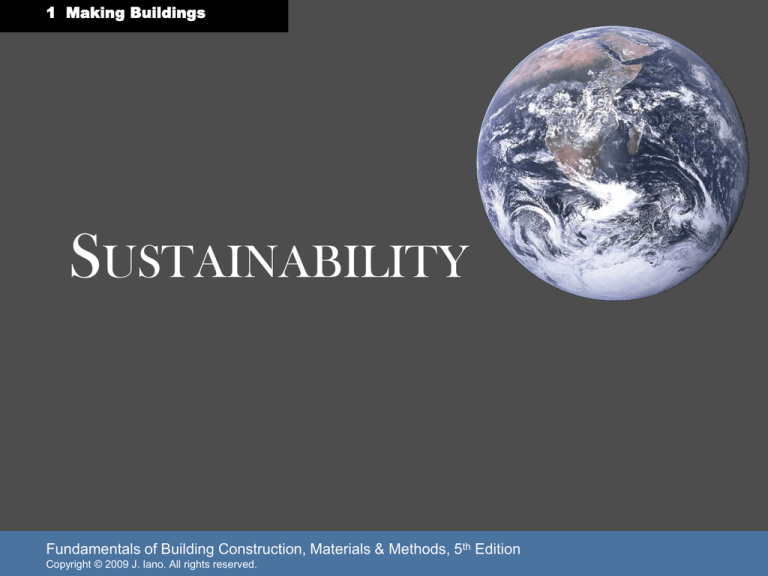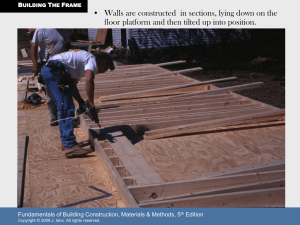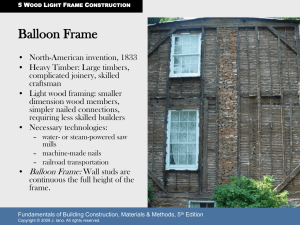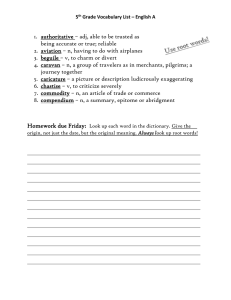S USTAINABILITY Fundamentals of Building Construction, Materials & Methods, 5 Edition
advertisement

1 Making Buildings SUSTAINABILITY Fundamentals of Building Construction, Materials & Methods, 5th Edition Copyright © 2009 J. Iano. All rights reserved. Sustainability Environmental Impacts of Buildings • 30 to 40 percent of world’s energy use and associated greenhouse gasses • One-third of U.S. energy use • Two-thirds of U.S. electricity consumption • 30 percent of U.S. raw materials consumption, 25 percent of its harvested wood, and 12 percent of its fresh water Fundamentals of Building Construction, Materials & Methods, 5th Edition Copyright © 2009 J. Iano. All rights reserved. Sustainability Environmental Impacts of Buildings • Nearly one-half of U.S. greenhouse gas emissions Fundamentals of Building Construction, Materials & Methods, 5th Edition Copyright © 2009 J. Iano. All rights reserved. Sustainability Sustainability Meeting the needs of the present generation without compromising the ability of future generations to meet their needs… Fundamentals of Building Construction, Materials & Methods, 5th Edition Copyright © 2009 J. Iano. All rights reserved. Sustainability Sustainable Building Construction • Reduce the depletion of fossil fuels • Minimize the use of valuable, productive land • Minimize materials consumption and waste • Protect forests and forest ecosystems • Protect water resources • Minimize air pollution • Maximize the healthfulness of the interior building environment Fundamentals of Building Construction, Materials & Methods, 5th Edition Copyright © 2009 J. Iano. All rights reserved. Sustainability Sustainable Building Construction Green building Produce buildings that are healthful for their occupants, protect resources, promote environmental quality, and provide the broadest social benefit. Fundamentals of Building Construction, Materials & Methods, 5th Edition Copyright © 2009 J. Iano. All rights reserved. Sustainability The Building Life Cycle Sustainable building construction must address all phases of the life of a building material, that is, from cradle to grave. – – – – Origin, manufacturing, and transportation Construction Use and maintenance Demolition, and reuse or disposal Fundamentals of Building Construction, Materials & Methods, 5th Edition Copyright © 2009 J. Iano. All rights reserved. Sustainability Assessing Green Buildings U.S. Green Building Council (USGBC) Leadership in Energy and Environmental Design (LEED) Green Building Rating System – – – – – Existing Buildings LEED-EB Commercial Interiors LEED-CI Building core and shell construction LEED-CS Homes LEED-H also Schools, Retail, Healthcare, Neighborhood Development Fundamentals of Building Construction, Materials & Methods, 5th Edition Copyright © 2009 J. Iano. All rights reserved. Sustainability Assessing Green Buildings LEED for New Construction and Major Renovations projects LEED-NC – – – – – – – Sustainable Sites Water Efficiency Energy & Atmosphere Materials & Resources Indoor Environmental Quality Innovation & Design Process Regional Priority Credits Fundamentals of Building Construction, Materials & Methods, 5th Edition Copyright © 2009 J. Iano. All rights reserved. Sustainability Assessing Green Buildings LEED-NC Materials & Resources credits Fundamentals of Building Construction, Materials & Methods, 5th Edition Copyright © 2009 J. Iano. All rights reserved. Sustainability Assessing Green Buildings LEED-NC certification: 100 base points plus 10 bonus points available • Platinum: 80+ points • Gold: 60-79 points • Silver: 50-59 points • Certified: 40-49 points Fundamentals of Building Construction, Materials & Methods, 5th Edition Copyright © 2009 J. Iano. All rights reserved. Sustainability Assessing Green Buildings Other green building assessment programs • Green Building Initiative Green Globes • National Association of Home Builders (NAHB) Green Home Building Guidelines • NAHB and International Code Council National Green Building Standard Fundamentals of Building Construction, Materials & Methods, 5th Edition Copyright © 2009 J. Iano. All rights reserved. Sustainability Assessing Green Buildings Energy conservation programs • American Society of Heating, Refrigeration and Air-Conditioning: Advanced Energy Design Guides • U.S. Environmental Protection Agency: Energy Star Fundamentals of Building Construction, Materials & Methods, 5th Edition Copyright © 2009 J. Iano. All rights reserved. 1 Making Buildings THE WORK OF THE DESIGN PROFESSIONAL: CHOOSING BUILDING SYSTEMS Fundamentals of Building Construction, Materials & Methods, 5th Edition Copyright © 2009 J. Iano. All rights reserved. THE WORK OF THE DESIGN PROFESSIONAL Zoning Ordinances Control land use: – Types of allowed activities, such as industrial, commercial, residential, etc. – How much land may be covered by building – Distance from buildings to property lines – Parking requirements – Building height and area – Special fire district requirements, etc. Fundamentals of Building Construction, Materials & Methods, 5th Edition Copyright © 2009 J. Iano. All rights reserved. THE WORK OF THE DESIGN PROFESSIONAL Building Codes Primarily regulate health and life safety, including: • Fire safety • Emergency egress • Construction quality • Structural integrity • Durability • Livability • Also: Energy conservation, accessibility for physically handicapped, sustainability Fundamentals of Building Construction, Materials & Methods, 5th Edition Copyright © 2009 J. Iano. All rights reserved. THE WORK OF THE DESIGN PROFESSIONAL Model Building Codes Standardized codes, adopted and put into legal effect by local jurisdictions • Canada: National Building Code of Canada • U.S.: – International Building Code (IBC) – International Residential Code (IRC) Fundamentals of Building Construction, Materials & Methods, 5th Edition Copyright © 2009 J. Iano. All rights reserved. THE WORK OF THE DESIGN PROFESSIONAL Model Building Codes IBC and IRC are the models for most U.S. local building codes. • IRC: – One- and two-family homes – Townhouses – 3 stories maximum height • IBC: All building types except those covered by the IRC Fundamentals of Building Construction, Materials & Methods, 5th Edition Copyright © 2009 J. Iano. All rights reserved. THE WORK OF THE DESIGN PROFESSIONAL IBC Occupancy Groups Define the type of activities within a building • A Assembly • B Business • E Educational • F Factory • H High hazard • I Institutional • M Mercantile • R Residential • S Storage • U Utility Many buildings have more than one occupancy group. Fundamentals of Building Construction, Materials & Methods, 5th Edition Copyright © 2009 J. Iano. All rights reserved. THE WORK OF THE DESIGN PROFESSIONAL IBC Occupancy Groups Occupancy Group definitions reflect the relative safety concerns of different types of activities. Examples: • Occupancy Group A – Includes theaters, auditoriums, lecture halls, night clubs, and other places of public gathering. – Such spaces, with large crowds in unfamiliar settings, need special attention to emergency exit provisions. Fundamentals of Building Construction, Materials & Methods, 5th Edition Copyright © 2009 J. Iano. All rights reserved. THE WORK OF THE DESIGN PROFESSIONAL IBC Occupancy Groups • Occupancy Group I Institutional – Includes hospitals, prisons, and other facilities where occupants can not fend for themselves in an emergency. – Where occupants cannot readily exit a facility during an emergency, protected areas within the building must be provided where occupants can wait for assistance. Fundamentals of Building Construction, Materials & Methods, 5th Edition Copyright © 2009 J. Iano. All rights reserved. THE WORK OF THE DESIGN PROFESSIONAL IBC Construction Types Define buildings constructed to varying degrees of resistance to fire • Type I – Most resistant • Type II • Type III • Type IV • Type V - Least resistant Fundamentals of Building Construction, Materials & Methods, 5th Edition Copyright © 2009 J. Iano. All rights reserved. THE WORK OF THE DESIGN PROFESSIONAL IBC Construction Types Combustibility Type I Type II Noncombustible materials only (steel, concrete, masonry) Type III Noncombustible exterior walls and combustible (wood) interior materials Type IV Type V Fully noncombustible Fundamentals of Building Construction, Materials & Methods, 5th Edition Copyright © 2009 J. Iano. All rights reserved. THE WORK OF THE DESIGN PROFESSIONAL IBC Construction Types Fire Resistance (resistance to the heat of fire) Construction Type I Type II Type III Type IV Type V Loadbearing Structure 1 – 3 hours 0 – 1 hour 0 – 2 hours 1 – 2 hours, or Heavy Timber (large wood members, very slow to burn) 0 – 1 hour Fundamentals of Building Construction, Materials & Methods, 5th Edition Copyright © 2009 J. Iano. All rights reserved. THE WORK OF THE DESIGN PROFESSIONAL IBC Construction Types Table 601: Fire resistance rating requirements (in hours) for building elements Fundamentals of Building Construction, Materials & Methods, 5th Edition Copyright © 2009 J. Iano. All rights reserved. THE WORK OF THE DESIGN PROFESSIONAL IBC Allowable Height and Area Occupancy groups and construction types are used to determine maximum allowable building size. • Occupancies with greater hazard: smaller buildings • Construction systems less resistant to fire: smaller buildings • And visa-versa… Fundamentals of Building Construction, Materials & Methods, 5th Edition Copyright © 2009 J. Iano. All rights reserved. THE WORK OF THE DESIGN PROFESSIONAL IBC Allowable Height and Area Table 503: Number of stories, height in feet, and area per floor depending on occupancy and construction type Fundamentals of Building Construction, Materials & Methods, 5th Edition Copyright © 2009 J. Iano. All rights reserved. THE WORK OF THE DESIGN PROFESSIONAL IBC Allowable Height and Area Modifications to tabulated height and area limitations: • Providing greater fire-fighter access around the building: allows increase in building size • Increasing building height above 3 stories: requires reduction in area per floor (total area of all floors remains fixed) Fundamentals of Building Construction, Materials & Methods, 5th Edition Copyright © 2009 J. Iano. All rights reserved. THE WORK OF THE DESIGN PROFESSIONAL IBC Allowable Height and Area Fire sprinklers: Historically proven to provide a major life safety benefit. • Adding fire sprinklers to a building allows a 400 percent increase in allowable area for a 1-story building or a 300 percent increase in allowable area for buildings greater than 1 story in height. • The presence of sprinkler systems provides many other bonuses in other parts of the code. Fundamentals of Building Construction, Materials & Methods, 5th Edition Copyright © 2009 J. Iano. All rights reserved. THE WORK OF THE DESIGN PROFESSIONAL Other Design Constraints • Accessibility: Americans with Disabilities Act, Fair Housing Act, and other accessibility regulations • Worker safety: Occupational Safety and Health Administration regulations • Environmental regulations: Protection of sensitive land, limits on emission of air pollutants, etc. • Building insurance industry: Incentives to build in ways that limit property damage • and more Fundamentals of Building Construction, Materials & Methods, 5th Edition Copyright © 2009 J. Iano. All rights reserved. 1 Making Buildings CONSTRUCTON STANDARDS AND INFORMATION RESOURCES Fundamentals of Building Construction, Materials & Methods, 5th Edition Copyright © 2009 J. Iano. All rights reserved. CONSTRUCTION STANDARDS & INFORMATION RESOURCES Standards-Setting Agencies Most construction standards are developed by independent organizations that rely on industry consensus for adoption. Examples: • ASTM International: consensus organization for materials and methods standards • American National Standards Institute (ANSI): develops and certifies standards for a wide variety of products and systems • International Code Council: IBC, IRC, accessibility standards, green building standards, etc. Fundamentals of Building Construction, Materials & Methods, 5th Edition Copyright © 2009 J. Iano. All rights reserved. CONSTRUCTION STANDARDS & INFORMATION RESOURCES Standards-Setting Agencies Also government agencies, such as: • U.S. Department of Commerce, National Institute of Science and Technology (NIST) • National Research Council Canada Institute for Research in Construction (NRC-IRC) • U.S. Consumer Product Safety Commission Fundamentals of Building Construction, Materials & Methods, 5th Edition Copyright © 2009 J. Iano. All rights reserved. CONSTRUCTION STANDARDS & INFORMATION RESOURCES Construction Trade and Professional Organizations Perform research and develop standards relevant to their particular group’s interests. Examples: • American Institute of Architects (AIA) • Construction Specifications Institute (CSI) • American Institute of Steel Construction (AISC) • Western Wood Products Association • and many, many more… Fundamentals of Building Construction, Materials & Methods, 5th Edition Copyright © 2009 J. Iano. All rights reserved. CONSTRUCTION STANDARDS & INFORMATION RESOURCES MasterFormat Numbering system for the organization of construction materials and systems • Developed by CSI and Canadian counterpart Construction Specifications Canada (CSC) • 50 major Divisions Fundamentals of Building Construction, Materials & Methods, 5th Edition Copyright © 2009 J. Iano. All rights reserved. CONSTRUCTION STANDARDS & INFORMATION RESOURCES MasterFormat Procurement and Contracting Requirements Group Division 00 – Procurement and Contracting Requirements Specifications Group General Requirements Subgroup Division 01 – General Requirements Facility Construction Subgroup Division 02 – Existing Conditions Division 03 – Concrete Division 04 – Masonry Division 05 - Metals Division 06 – Wood, Plastics, and Composites Division 07 – Thermal and Moisture Protection Division 08 – Openings Division 09 – Finishes Division 10 – Specialties Division 11 – Equipment Division 12 – Furnishings Division 13 – Special Construction Division 14 – Conveying Equipment Facilities Services Subgroup Division 21 – Fire Suppression Division 22 – Plumbing Division 23 – Heating, Ventilating, and Air Conditioning Division 25 – Integrated Automation Division 26 – Electrical Division 27 – Communications Division 28 – Electronic Safety and Security Site and Infrastructure Subgroup Division 31 – Earthwork Division 32 – Exterior Improvements Division 33 – Utilities These are the Divisions most relevant to this text and building construction in general. Fundamentals of Building Construction, Materials & Methods, 5th Edition Copyright © 2009 J. Iano. All rights reserved. CONSTRUCTION STANDARDS & INFORMATION RESOURCES MasterFormat Divisions are subdivided in Sections, that define the work of individual trades or suppliers. Sections may be further subdivided if needed. Division 05 – Metals Section 05 10 00 – Structural Steel Framing Section 05 21 00 – Steel Joist Framing Section 05 31 00 – Steel Decking Section 05 40 00 – Cold-Formed Metal Framing Section 05 50 00 – Metal Fabrications Section 05 51 33 – Metal Ladders Section 05 51 33.13 Vertical Metal Ladders Fundamentals of Building Construction, Materials & Methods, 5th Edition Copyright © 2009 J. Iano. All rights reserved. CONSTRUCTION STANDARDS & INFORMATION RESOURCES MasterFormat • Provide an outline for construction specifications, the written portion of construction documents • Organize construction cost data • Organize trade and technical literature • May be used to systematize notes on construction drawings Fundamentals of Building Construction, Materials & Methods, 5th Edition Copyright © 2009 J. Iano. All rights reserved. CONSTRUCTION STANDARDS & INFORMATION RESOURCES Other organizational systems • CSI/CSC Uniformat – Classification of building elements by functional groups, such as substructure, shell, interiors, services, etc. – Recommended for early stage design and pricing • OmniClass Construction Classification System (OCCS) – A broadly flexible system that can be used to organize construction information according to any of a number of schemes, such as function, form, elements, work results, phases, properties, etc. Fundamentals of Building Construction, Materials & Methods, 5th Edition Copyright © 2009 J. Iano. All rights reserved. 1 Making Buildings THE WORK OF THE CONSTRUCTION PROFESSIONAL: CONSTRUCTION BUILDINGS Fundamentals of Building Construction, Materials & Methods, 5th Edition Copyright © 2009 J. Iano. All rights reserved. THE WORK OF THE CONSTRUCTION PROFESSIONAL Providing Construction Services Allocation of responsibilities and risks among major parties • Design team: architects, engineers, and other consultants • Construction team: General contractor, subcontractors, suppliers • Owner team: Owner, financers, user groups Fundamentals of Building Construction, Materials & Methods, 5th Edition Copyright © 2009 J. Iano. All rights reserved. THE WORK OF THE CONSTRUCTION PROFESSIONAL Providing Construction Services Design/Bid/Build • Owner separately hires design team and construction team • Advantage: Separate design and construction entities provide useful checks and balances • Disadvantage: Difficult to integrate construction expertise into design Fundamentals of Building Construction, Materials & Methods, 5th Edition Copyright © 2009 J. Iano. All rights reserved. THE WORK OF THE CONSTRUCTION PROFESSIONAL Providing Construction Services Design/Build • Owner hires one entity that provides both design and construction services • Advantage: Allows fuller collaboration between design and construction teams • Disadvantage: Lack of independent advocate for design; fewer built in checks and balances Fundamentals of Building Construction, Materials & Methods, 5th Edition Copyright © 2009 J. Iano. All rights reserved. THE WORK OF THE CONSTRUCTION PROFESSIONAL Providing Construction Services Construction Management • Owner hires CM as independent entity to oversee design and construction services provided by multiple entities • Advantage: Independent construction expertise is available to owner throughout project • Most commonly associated with large scale, complex projects Fundamentals of Building Construction, Materials & Methods, 5th Edition Copyright © 2009 J. Iano. All rights reserved. THE WORK OF THE CONSTRUCTION PROFESSIONAL Providing Construction Services Other project delivery forms • CM at risk: combines aspects of construction manager with general contractor. • Turnkey construction entity: provides financing as well as construction services • Single-purpose entity: combines owner, design, and construction teams into one legal entity • and many more variations Fundamentals of Building Construction, Materials & Methods, 5th Edition Copyright © 2009 J. Iano. All rights reserved. THE WORK OF THE CONSTRUCTION PROFESSIONAL Paying for Construction Services • Fixed fee (lump sum) – Owner pays an agreed, fixed amount for work to be performed. – GC assumes most risk or potential reward for unexpected construction costs or savings. – Best suited to projects where scope of work is clearly defined before construction starts. (If scope is unknown, it is difficult to determine what the fixed, full cost should be.) Fundamentals of Building Construction, Materials & Methods, 5th Edition Copyright © 2009 J. Iano. All rights reserved. THE WORK OF THE CONSTRUCTION PROFESSIONAL Paying for Construction Services • Cost plus a fee – Owner pays GC’s costs plus a fee. – Owner assumes more cost risk/savings reward potential. – Well suited to projects where scope is not fully defined when construction begins. – Can include a guaranteed maximum fee to cap Owner’s cost risk. Fundamentals of Building Construction, Materials & Methods, 5th Edition Copyright © 2009 J. Iano. All rights reserved. THE WORK OF THE CONSTRUCTION PROFESSIONAL Construction Phasing Sequential Construction • Each major project phase begins only after the preceding phase is completed. • Design is completed before construction begins. Fundamentals of Building Construction, Materials & Methods, 5th Edition Copyright © 2009 J. Iano. All rights reserved. THE WORK OF THE CONSTRUCTION PROFESSIONAL Construction Phasing Phased Construction • Design and construction phases overlap. • Construction starts before design is complete. • Aim is to reduce total project duration. Fundamentals of Building Construction, Materials & Methods, 5th Edition Copyright © 2009 J. Iano. All rights reserved. THE WORK OF THE CONSTRUCTION PROFESSIONAL Construction Phasing • Sequential construction is simpler to manage. • Phased construction requires closer coordination between design and construction activities. • Phased construction can introduce additional risks if elements built early come into conflict with later design decisions. Fundamentals of Building Construction, Materials & Methods, 5th Edition Copyright © 2009 J. Iano. All rights reserved. THE WORK OF THE CONSTRUCTION PROFESSIONAL Construction Phasing • Phased construction is most naturally suited to design/build and construction management project delivery, where construction expertise is available during the design phases of the project. • Traditionally, sequential construction is most commonly associated with design/bid/build construction. Fundamentals of Building Construction, Materials & Methods, 5th Edition Copyright © 2009 J. Iano. All rights reserved. THE WORK OF THE CONSTRUCTION PROFESSIONAL Construction Scheduling Gantt Charts • Represent project tasks or phases on a horizontal timeline • Provide an easy to understand picture of a project schedule and task relationships. Fundamentals of Building Construction, Materials & Methods, 5th Edition Copyright © 2009 J. Iano. All rights reserved. THE WORK OF THE CONSTRUCTION PROFESSIONAL Construction Scheduling Critical Path Method • Analyzes task dependencies. • The critical path is the sequence of tasks that determines the least amount of time in which a project can be completed. Fundamentals of Building Construction, Materials & Methods, 5th Edition Copyright © 2009 J. Iano. All rights reserved. THE WORK OF THE CONSTRUCTION PROFESSIONAL Trends in the Delivery of Design and Construction Services • Improving collaboration between major parties: design/build construction, integrated practice models, etc. • Improving efficiency in production: lean construction • Improving information management: building information modeling (BIM) Fundamentals of Building Construction, Materials & Methods, 5th Edition Copyright © 2009 J. Iano. All rights reserved.



